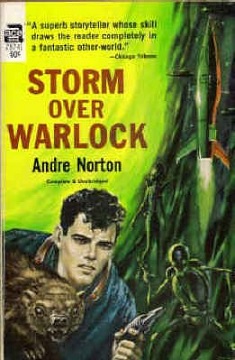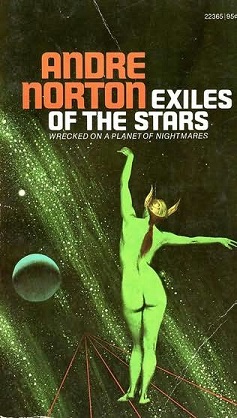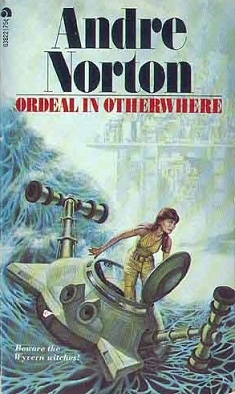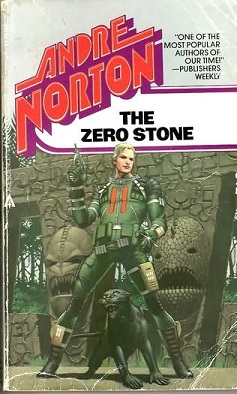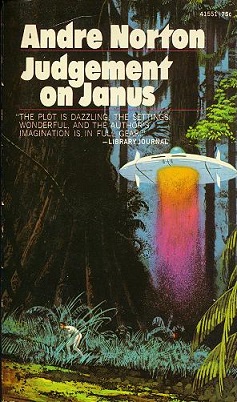
Judgement on Janus
Andre Norton
188 pages
published in 1963
It’s a miracle: I actually managed to start an Andre Norton series in the right order: Judgement on Janus is the first of a duology, together with Victory on Janus. Another minor miracle is the fact that my copy lasted long enough for me to read it as the cover was flaking off something fierce. Normally Ace paperbacks hold up better. This is actually one of the first Norton novels I’d bought, years ago, but had never read so far.
Naill Renfro is a young man who, caught up in the slums of the Dipple, sells himself as indentured labour (just like Charis Nordholm) in order to have enough money to give his mother a dignified death. He ends up on the planet Janus, where dour religious fanatics fight a never ending battle against the primeval forests covering the planet. These forests they consider a source of evil, as they do many things, especially the alien relics or treasures occassionally found. These are supposed to be reported and destroyed immediately. Those who don’t report it and try to keep them for themselves are punished by god with the green sick and left in the forest to die. Three guesses what happens to Naill.
Yes, he discovers an alien treasure, tries to keep part of it for himself, is caught and indeed gets the disease. Left alone to die he wakes up with his skin turned green, his ears pointed, hairless and with eyes blinded by sunlight but thriving in the dark. Oh, and he now also has the confused memories of an alien warrior called Ayyar. To Naill-Ayyar the forest is now no longer something to be feared, but a living home, while the garth men trying to tame and destroy are even more repulsive.
Naill struggles to come to grip with his new heritage as he wonders whether his transformation was an unfortunate side effect, or deliberately engineered. If the latter, has the same happened to other victims of the green sickness? As he tries to track down any signs of earlier people transformed into Iftin, he instead runs into a newer victim, a young woman he had observed earlier being more interested in the forest than the average garth. He rescues her from her confinement and discovers that Ashla, reborn with the memories of Illylle, a one time priestess of the Mirror, has just as confused memories as he himself has, but is able to remember more.
She also remembers enough of her previous human life to want to rescue her sister from the holding. That however goes badly wrong and they’re forced to flee into the wastelands where an ancient evil, the ancient enemy that ended the rule of the Iftin thousands of years before human settlers landed, still waits…
The idea of changelings, of humans transformed into aliens, is of course an old idea, found in myths and legends all over the world. Norton’s science fictionalisation of it works well, partially because she’s careful never to explain the technology that made it possible. It’s Clarke’s third law of technology in action: any sufficiently advanced form of technology is indisguisable from magic and here the Terran technology, with its blasters and space suits and rocket ships is dropped into what is arguably a fantasy world. One of the most unsettling scenes in the book is when Naill and Ashla are hunted by a animated spacesuit of an obsolete but recognisable human design.
One recurring theme in Norton’s settings, which comes especially to the fore in Judgement on Janus, is religious fanatics as the enemy and plot driver. We’ve had religious thugs starting the action in The Zero Stone by attacking the protagonist, Charis Nordholm driven away from her home by the hatred of her religious neighbours in Ordeal in Otherwhere and here the hate of the garth for the forest. There’s even the corrupt priesthood in Exiles of the Stars setting that story in motion. Once you see this pattern you can’t unsee it: religious fanatics make a good enemy for Norton, something for her heroes to distinguish themselves from, push against.
Judgement on Janus ends, not so much on a cliffhanger, but with a room for a sequel. That sequel, Victory on Janus would be written three years later and is what I’m currently reading.
